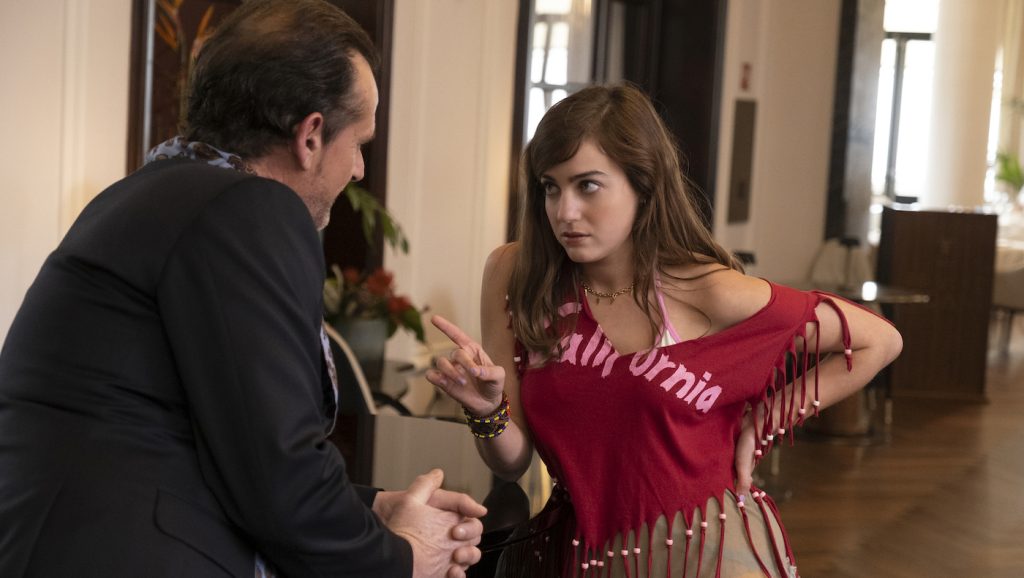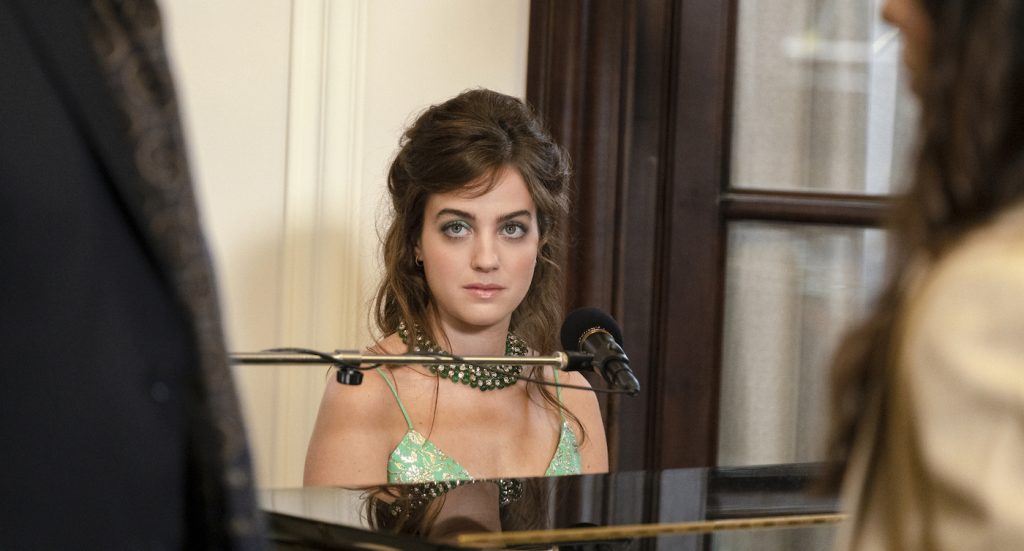“The White Lotus” Emmy-Nominated Music Supervisor Gabe Hilfer on Mia’s Musical Chops, Tanya’s Swan Song & More
Season two of Mike White’s killer satire The White Lotus established, from that gorgeous opening title sequence, that it was going to be a thing of beauty to hear as well as behold. Sure, you can hardly find a more lush location than Sicily, where this particular outpost of the titular resort chain is located, but Italy is more than just a feast for the eyes and, if you’re lucky enough to visit, for the tastebuds. It’s also a place with a rich musical history, from late 16th-century opera to Puccini’s iconic 20th-century work to household names like Pavarotti to their particular flavor of jazz, pop, disco, folk, and more. It’s a country that delights all five senses.
White made the most of the inherent drama of Italy, specifically Sicily, setting up season two from the jump as a murder mystery. The moment Daphne (Meghann Fahy), out for the last swim of her vacation, bumps into a dead body in the water, identifying the bodies before the season wrapped became the most pressing concern for millions of viewers. White deployed his freshly Emmy-nominated composer Cristobal Tapia de Veer, and his equally brand new Emmy-nominee music supervisor Gabe Hilfer to help him create a properly baroque, occasionally bouncy, and at times haunting soundscape to build the tension to the season’s climatic reveal of who those floating corpses were.
Yet White’s ambitions for the sound of the second season weren’t just about the score; a major plot point revolves around the musical aspirations of the talented singer and piano player Mia (Beatrice Grannó, a musician in real life) as she angles to get a job playing at the White Lotus, one that belongs to the older, loungier Gisueppe (Federico Scribani), the resort’s slithery smooth house musician whose attraction to Mia becomes her way onto his piano bench.
We spoke to Hilfer about the demands of capturing live performances, tracking down the rights holders to old Italian songs, and how he helped shape—very belated spoiler alert—Tanya’s (Jennifer Coolidge) fateful final boat trip.
Describe your role as the music supervisor for this music-drenched second season.
I got brought in pretty early because there’s a bunch of music on camera, like Giuseppe and Mia singing on camera. You need to get in early and figure out what the songs are going to be; even when the band is playing The Godfather stuff over at the mansion, we needed to make sure we could get signed off on what we wanted creatively for that. But let’s take a step back—generally, my job is to work with showrunner and help them realize their musical vision for the series, from beginning to end, conceptually figuring out how they want to use songs, how they want to use score, and if there’s anything we need to deal with for production. This includes figuring out what songs will be sung on camera? Can we get the rights to those songs? Can we get them approved and cleared? Do we want to pre-record them so the actors performing them on camera don’t have to perform them live in the moment?
That’s a lot of work.
And then, when we get to post, we get to play around and have a lot of fun and see which songs work in which scenes. We work with editors to see how music can help elevate the story and move it forward, whether the music can make it fun or mysterious or whatever the emotions we’re trying to achieve are. Sometimes it’s counterpoint, sometimes it’s congruent with what we’re doing on screen, and that’s my job. Be everything music and help in every way possible to get the showrunner’s dream version of the project on the screen.
How did the fact that season two immediately sets itself up to be a murder mystery affect how you approached the music?
I think this was a way different tone. Anecdotally, while the show was airing, I’ve never had more people reach out to me and venture guesses about who dies at the end. I would say to all of them, ‘Do you really want me to tell you? You can’t seriously want me to spoil this for you.’ And every person was like, yeah, don’t. From the jump, the scripts laid out the tone of the mystery. It had a bit more darkness in season two, it’s definitely a little bit scarier, and there are more ominous tones. We tried to encapsulate that musically and, very conveniently, Italian music, especially vintage Italian music, lends itself really nicely to very deep, interesting vibes that don’t necessarily fit into a super fun pop genre. Our composer, composer Cristobal [Tapia de Veer], is a genius, but the songs really helped place us in Italy specifically. That was always of paramount importance. We wanted to make the music authentic to the location and then, within that subset of Italian music, craft a mysterious, ongoing musical landscape that really could immerse the audience in the tone and vibe of the show.
Then adding another level of musical complexity, you’ve got Mia (Beatrice Grannó), an aspiring musician who performs a few times during the season.
We had been in touch with Beatrice early on, trying to figure out what she was comfortable singing. She’s a real singer, so we spoke early on to see what she was comfortable with, and then there’s Giuseppe, who she takes over from after he collapses; he’s meant to be a little bit more of an Italian lounge singer at a high-end international resort and meant to be a little over the top. And then the contrast with Mia is meant to be very stark. She’s a super talented, incredibly attractive woman who comes in and is a really sexy singer who adds a whole other element to it. She’s the opposite of cheesy, the opposite of cliche. She’s really a talented performer. So figuring out what songs she’d sing and crafting that with her, Mike [White], and producers, we had to figure that all out before they shot anything. We had rehearsals, we prerecorded some of the piano; it was a whole thing.


How much musical notation, so to speak, were in the scripts?
When I read the scripts, there were songs in every single episode. I was like, this is going to be incredible because you don’t often get such an on-camera musical component to every show. A lot of times, it’s like playing around in editorial, which is incredibly fun, too. But this adds a whole other dynamic.
Tell me a bit about securing the rights to music. I imagine it can be a complicated process.
Yup, we do. Early on, they tell us how much money has been allocated for licensing, which can get really expensive. For every song that you license for TV or for movies, there are two parts to the song; the recording and whoever owns it, usually it’s a record label or an artist, and then there’s the publishing, which represents the intellectual property of the song, like the songwriters. So if you do a cover like “All Along the Watchtower,” which was made famous by Jimi Hendrix, it was Bob Dylan’s song, so even if you want to use the Hendrix’s version, you need to get Dylan’s approval because he wrote it. But the master part depends on which recording you want to use, so in this case, you’d need to get Hendrix’s record label’s permission. You have to do this with every single song, and some of these songs are written by three, four, even six writers. There are a couple of songs in this series that got real dicey because there are like nine or ten moving parts to one song that all need to get approved, and they all need to agree with each other, and they all need to get back to you in a certain amount of time, and all they all need to be reasonable in the amount of money they want. It’s the less sexy part of my job.
So you end up spending a lot of time sleuthing for who wrote what, who owns what, and where everyone is?
Yeah. There’s a song in the show that had four publishers and three writers, and two of the publishers were out of business; there’s no real clear line to who owned them, and we had to dig and dig and work with people on the ground in Italy. You have to be a private investigator without being so annoying you piss people off but being aggressive enough that you get it done on your timeline. An added bonus on this show was a lot of things came to a head in the month of August last year, and if you’ve ever been to Italy in the month of August, it’s basically vacation month. Lie, the whole country is off. So getting people to respond to you in a timely fashion in the month of August is basically impossible.
When you look back on the season, do any musical moments stand out to you that you’re especially happy about?
I’m really proud of all the stuff we did on camera. That was really plot-related and stuff we had to map out from the very beginning. One of my favorite songs that I find myself listening to more than others is “Ogni Uno,” which is when Tanya’s on the boat on the way to the party with the gay guys at their villa. It’s when you’re setting off, the world’s great, and everything is fun—before the rug is pulled out from under her. It was important for us to set it up like life is good and everyone is happy.
You also work in tandem with the editors—can you tell me a bit about that process?
They edit this show in Hawaii because that’s where Mike [White] lives, and the editors [John Valerio and Heather Persons] move to Hawaii to edit there. They have such a finger on the pulse of the tone and the pacing. Working with John was fantastic, his musical sensibilities are all over the show as well. A lot of the work is back and forth with the editors and getting their notes about what works and doesn’t work and digesting it all, and translating it into music.
And what about your musical approach to Tanya’s very fateful boat trip at the end?
It’s very operatic, and originally we had discussed how there were ways to connect it to the opera that they go to earlier in the season [“Madame Butterfly”] and figure out how this tragedy happens. She’s in a shootout, she kills everybody, but then she dies because she trips on the boat. It’s the tragedy of the whole scenario, it’s not funny, but it’s a very ironic way to go out at the end. So, the music was meant to play to the seriousness and sincerity of the whole scene, but add whatever is one degree short of levity and create an Italian opera tragedy version of how the heroine of our story passes away so unceremoniously.
Listen to Gabe’s playlist for The White Lotus here:
Featured image: Beatrice Grannò. Photograph by Fabio Lovino/HBO



